#Ellen Weintraub
Text
The Federal Election Commission recently let a US company that was quietly bankrolled by Russian oligarchs off with a slap on the wrist despite discovering that it had illegally funneled Russian funds to US political candidates in the 2018 midterm elections, two Democratic FEC commissioners said in a scathing statement issued Friday.
“Half the Commission chose to reject the recommendation of the agency’s nonpartisan Office of General Counsel and turned a blind eye to the documented use of Russian money for contributions to various federal and state committees in the 2018 elections,” wrote the two commissioners, Ellen Weintraub and Shana Broussard.
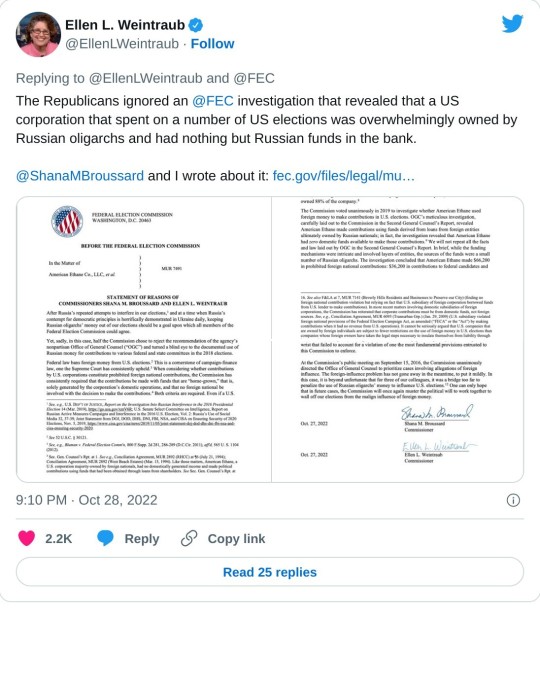
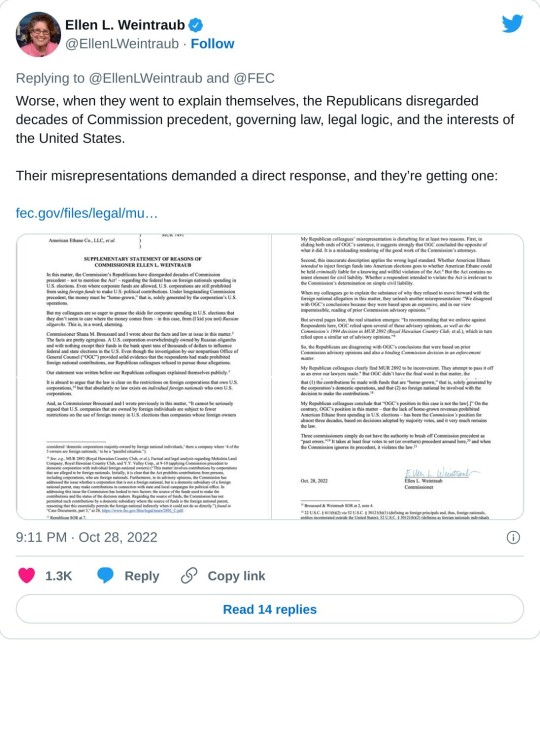
Anyone who follows campaign finance knows that the FEC has been toothless for years due to GOP commissioners’ opposition to any enforcement of laws designed to oversee money in politics. But Weintraub and Broussard suggest the agency hit a new low by letting the US firm, American Ethane, off with a deal in which it agreed to pay only a small civil fine.
Though based in Houston, Texas, and run by American CEO John Houghtaling, 88% of American Ethane was owned by three Russian nationals—Konstantin Nikolaev, Mikhail Yuriev, and Andrey Kunatbaev. The FEC report said that Nikolaev, an oligarch and Russian billionaire with close ties to Russian President Vladimir Putin, is the controlling shareholder. Separately, Nikolaev also underwrote efforts by Maria Butina, a Russian gun rights activist, to cultivate ties with the National Rifle Association officials and with associates of Donald Trump around the time of the 2016 election. In 2018, Butina acknowledged acting as an unregistered Kremlin agent and pleaded guilty to participating in a conspiracy against the United States. She was sentenced to 18 months in prison but was deported six months later.
According to lobbying disclosures, the company was seeking help from US officials in its efforts to sell US ethane to China and, in 2018, had hired a US lobbying firm, Turnberry Solutions, with close ties to former Trump campaign chief Corey Lewandowski. A year later, Lewandowki officially joined Turnberry, after previously disputing his connections to the firm. Turnberry, which traded on ties to Trump, shut down in 2021, months after he left office.
The FEC investigation began after it received a complaint citing press reports on American Ethane’s ties to Nikolaev and its donations to lawmakers. Weintraub and Broussard noted that the FEC found that American Ethane “made contributions using funds derived from loans from foreign entities ultimately owned by Russian nationals.” Federal law bans foreign funds in US elections, as well as direct corporate donations to candidates. American Ethane seems to have done both. The FEC found that the company made more than $66,000 in donations using money it got from offshore firms in the form of loans. According to an FEC general counsel’s report released last year, the owners of the offshore firms included Alexander Voloshin, a Russian politician and former state power company official, and Roman Abramovich, an infamous Russian oligarch and former owner of the British football powerhouse Chelsea. The money the company used to dole out donations ultimately came from the oligarchs, the FEC said.
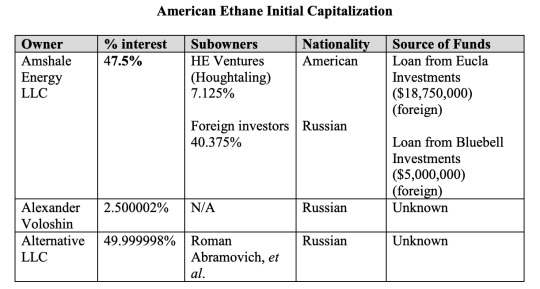
During its four-year investigation, the FEC found that the funds initially put up by Abromovich and other Russian nationals were then funneled to Republicans in Louisiana: Sens. John Kennedy and Bill Cassidy, a political action committee run by Kennedy, a leadership fund run by House Majority Whip Steve Scalise, a PAC backing Louisiana Attorney General Jeff Landry, and the campaigns of Reps. Mike Johnson and Garrett Graves. Other contributions went to state lawmakers. The report didn’t explain why the company focused on Louisiana but the state is home to many natural gas firms, and its lawmakers advocate for the industry.
The lawmakers who received funds have not been accused of knowingly taking Russian money, though the final report from the initial investigation noted, “American Ethane attempted to make more political contributions, but those recipient committees never deposited American Ethane’s checks.”
American Ethane argued that the funds the company first received appeared as loan to the American corporation. Therefore, they claimed the donations it made were not foreign. The FEC rejected that argument. But it still recommended the firm only pay $9,500 as a civil penalty.
“The foreign-influence problem has not gone away in the meantime, to put it mildly,” Weintraub and Broussard wrote. “In this case, it is beyond unfortunate that for three of our colleagues, it was a bridge too far to penalize the use of Russian oligarchs’ money to influence U.S. elections.”
#us politics#news#mother jones#2022#federal election commission#russia#russian federation#russian oligarchs#2018 elections#Ellen Weintraub#Shana Broussard#Republicans#gop#conservatives#American Ethane#Maria Butina#valdimir putin#Konstantin Nikolaev#Mikhail Yuriev#Andrey Kunatbaev#Turnberry Solutions#Corey Lewandowski#Donald trump#sen. john kennedy#sen. bill cassidy#rep. Steve Scalise#Jeff Landry#rep. Garrett Graves#rep. Mike Johnson#campaign finance laws
16 notes
·
View notes
Text
Why is it so useless?
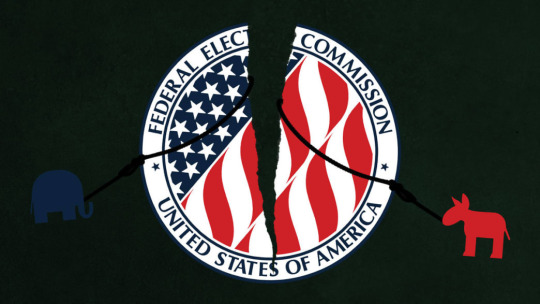
April 15, 2024
The Federal Election Campaign Act was signed into law in 1971 by President Nixon with the purpose of creating limits for campaign spending on communication media, adding additional penalties to the criminal code for election law violations, and imposing disclosure requirements for federal political campaigns. In 1974, the act was amended and established the Federal Election Commission to enforce these goals. It was a good idea while it lasted.
Because over the years, right-wing organizations and individuals have launched lawsuit after lawsuit aimed at eliminating any kind of election regulation whatsoever. And a conservative Supreme Court has been only too happy to help. In fact, almost immediately it ruled that limits on campaign contributions were unconstitutional (Buckley v. Valeo, 1976).
With the passage of the follow-up Bipartisan Campaign Reform Act in 2002, large chunks of this law too were struck down. The Court declared issue ads cannot be banned (FEC v. Wisconsin Right to Life, 2007), restrictions on wealthy candidates violate their First Amendment rights (Davis v. FEC, 2008) and, worst of all, corporations can spend unlimited amounts on campaigns (Citizens United v. FEC, 2010).
The arrangement of the FEC itself is also problematic. The commission consists of six members, three from each major party. Which almost guarantees gridlock since at least four of the six need to approve investigating any campaign violation. Still, according to the FEC's enabling statute, any non-enforcement is subject to judicial review. So, naturally, in June 2018, two Republican-appointed judges on the DC Circuit — including now-SCOTUS Justice Brett Kavanaugh — gutted that rule. No wonder that, of the 200 matters currently before the commission, only seven are under active investigation.
Of course, whenever the subject is election cheating, Donald Trump's name is always prominent. Most recently, he's been charged with illegally soliciting and directing "soft" (unregulated and undisclosed) money to an outside super PAC called America First Action, an outfit that spent almost $134 million on ads opposing Joe Biden in the 2020 election. Here's FEC Vice Chair Ellen Weintraub last December:
And for those keeping count, the tally is now 59 times the Commission has been presented with allegations that Mr. Trump or his committees violated the FECA, 29 times the Commission’s nonpartisan professional staff recommended that we take some steps to enforce the law, and (checks notes) still zero times a Republican commissioner has voted to approve any recommendation to enforce the law against Mr. Trump.
So if you're counting on the Federal Election Commission to rein in Trump's ongoing election crimes, don't bother. It's simply no use.
0 notes
Link
Check out this listing I just added to my Poshmark closet: DINER (1982) Vintage LASER VIDEODISC.
0 notes
Photo

Reposted from @motherjonesmag Shocker. The Federal Election Commission recently let a US company that was quietly bankrolled by Russian oligarchs off with a slap on the wrist despite discovering that it had illegally funneled Russian funds to US political candidates in the 2018 midterm elections, two Democratic FEC commissioners said in a scathing statement issued this past Friday. “Half the Commission chose to reject the recommendation of the agency’s nonpartisan Office of General Counsel and turned a blind eye to the documented use of Russian money for contributions to various federal and state committees in the 2018 elections,” wrote the two commissioners, Ellen Weintraub and Shana Broussard. Anyone who follows campaign finance knows that the FEC has been toothless for years due to GOP commissioners’ opposition to any enforcement of laws designed to oversee money in politics. But Weintraub and Broussard suggest the agency hit a new low by letting the US firm, American Ethane, off with a deal in which it agreed to pay only a small civil fine. Though based in Houston, Texas, and run by American CEO John Houghtaling, 88 percent of American Ethane was owned by three Russian nationals—Konstantin Nikolaev, Mikhail Yuriev, and Andrey Kunatbaev. The FEC report said that Nikolaev, an oligarch and Russian billionaire with close ties to Russian President Vladimir Putin, is the controlling shareholder. Separately, Nikolaev also underwrote efforts by Maria Butina, a Russian gun rights activist, to cultivate ties with National Rifle Association officials and with associates of Donald Trump around the time of the 2016 election. In 2018, Butina acknowledged acting as an unregistered Kremlin agent and pleaded guilty to participating in a conspiracy against the United States. She was sentenced to 18 months in prison but was deported six months later. According to lobbying disclosures, the company was seeking help from US officials in its efforts to sell US ethane to China. In 2018 it hired a US lobbying firm, Turnberry Solutions, with close ties to former Trump campaign chief Corey Lewandowski. And that's just the start of this web. Head to the link in our bio to read. https://www.instagram.com/p/CkcgBPgOP26/?igshid=NGJjMDIxMWI=
0 notes
Text
Net eye bloggers

#Net eye bloggers software
One page of the 47-page proposed regulation raises the question, and tentatively concludes that bloggers should not be required to disclose payments. (In last year's race, the Howard Dean campaign paid the publishers of the Daily Kos and MyDD blogs $3,000 a month.) For instance, he said, bloggers that get paid by political campaigns should be required to disclose their involvement in a prominent notice on their Web site. Hasen suggested that the proposed rules may not go far enough. Rick Hasen, a Loyola Law School professor who argued in court in favor of the BCRA, said that the "FEC's first stab at writing new rules raises as many questions as it seeks to answer, and we must remain wary of both intended and especially unintended consequences."
#Net eye bloggers software
The FEC's proposed regulations talk about "announcements placed for a fee on another entity's Web site." Smith asked: What if those are pop-up political ads generated by a software program such as Claria's "adware," instead of by a Web browser? Should the FEC target Claria, the advertiser or the Web site that happens to be in the background?.
If such a site "did not qualify for the press exemption, the mere fact that they're unpaid does not get them out from under the regulation." If they endorse candidates, they must be approved by the FEC as legitimate news organizations or run afoul of the law, Smith warned.
Some blogs, such as Daily Kos, are published by a corporation.
He pointed to the academic-leaning Volokh Conspiracy blog, which has multiple contributors. But what if a group of people jointly publish a blog? "If one of the bloggers received payment for an activity, would it turn the group into a political committee" subject to campaign finance regulation, Smith asked.
The draft rules provide some protections for "individual" political commentators.
FEC commissioners on Thursday said that they would make "case by case" decisions about who qualifies.Īs the Federal Election Commission takes its first steps to shape campaign rules for the blog era, FEC Commissioner Bradley Smith warned that proposed rules present unanswered questions for bloggers: But the definition is relatively narrow and covers only a "broadcasting station, newspaper, magazine, or other periodical publication"-it does not specifically include Web sites. But a growing number of bloggers are incorporating to gain protection from civil suits, he said, which means they could be prohibited from political activities unless they qualify as legitimate journalists.Ī section of current law known as the "media exemption" saysĬampaign-related expenditures aren't regulated if they're made by certain types of journalistic outlets. Krempasky said the draft rules, if finalized, would create a "regulatory minefield" because they give individuals greater leeway than corporations. Mike Krempasky, a contributor to conservative Web site who attended the meeting, said: "Don't believe Ellen Weintraub when she repeats her mantra of ' Bloggers, chill out!'" "The FEC does not tell private citizens what they can or can't say on the Internet or elsewhere."įEC Commissioner Danny McDonald, another Democrat, said: "I've never seen so much ado about nothing at this stage of the process."Īmong bloggers and political commentators, the reaction to the FEC's proposed regulations ( click for PDF) was mixed. "We are not the speech police," said FEC Commissioner Ellen Weintraub, a Democrat. District Judge Colleen Kollar-Kotelly's decision ( click for PDF) to include the Internet, but the Democrats refused.Įver since FEC Commissioner Bradley Smith, a Republican, warned of the possibility of an impending Internet crackdown in an interview with CNET in early March, an army of bloggers has mobilized to oppose intrusive regulations, and members of Congress have warned the commission that its actions are being closely watched.Īs a result, the Democratic commissioners on Thursday attempted to play down the significance of their opposition to an appeal a few months earlier. The three Republican commissioners had tried to persuade their three Democratic colleagues to appeal U.S. The FEC is in the unusual position of being required to extend the Bipartisan Campaign Reform Act (BCRA) because of a federal judge's order last fall. The final set of Internet rules could govern everything from whether bloggers are journalists to bulk political e-mail. The FEC has taken its first steps to shape campaign rules for the blog era.

0 notes
Link
Federal Election Commission commissioner Ellen Weintraub posted an extensive fact-checking thread to Twitter late Wednesday debunking claims by President Trump and some Republicans that mail-in voting can lead to fraud.
28 notes
·
View notes
Photo
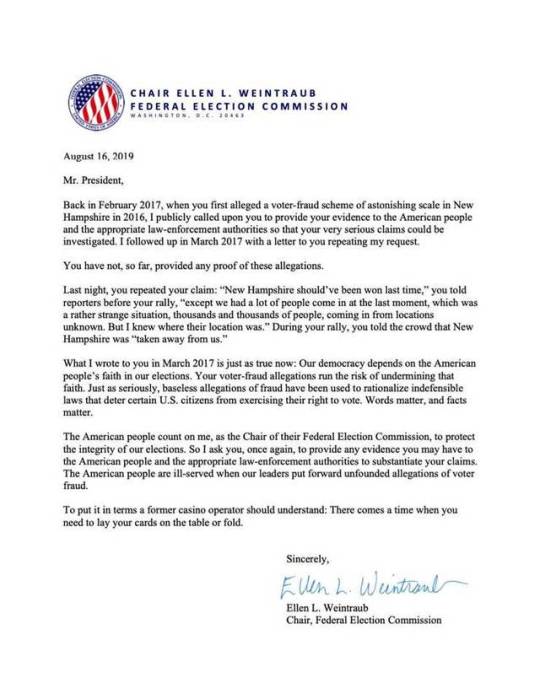
Even the Chair of the Federal Election Commission has had it with the orange buffoon’s insane shit.
18 notes
·
View notes
Link
💜 This is the second time Weintraub has stood up to Trump. She’s the only one serving in the government who is officially standing up to Trump — and she’s doing it in writing.
The first time was on June 13, 2019: “FEC Chair: It's Illegal To Accept Election Help From Foreign Governments“
SAD: Last night, @realDonaldTrump again made unfounded claims about massive voter fraud in NH in 2016.
In this letter, I ask him to back up his claims in terms a former casino operator should understand: “There comes a time when you need to lay your cards on the table or fold.”
— Ellen L Weintraub @EllenLWeintraub - Aug 16, 2019
👏👏👏 Ellen Weintraub for protecting our elections because Trump and Republicans REFUSE to #MoscowMitch #PutinRepublicans #RussianAssets
Snippet of her letter to #BenedictDonald #TRE45ON
The American people count on me, as the Chair of their Federal Election Commission, to protect the integrity of our elections.
So I ask you, once again, to provide any evidence you may have to the American people and the appropriate law-enforcement authorities to substantiate your claims. The American people are ill-served when our leaders put forward unfounded allegations of voter fraud.
🔥 “To put in terms a former casino operator would understand: There comes a time when you need to lay your cards on the table or fold.” 🔥
Trump’s response — DEAD SILENCE — just like a guy who got his nuts crushed by a strong woman.
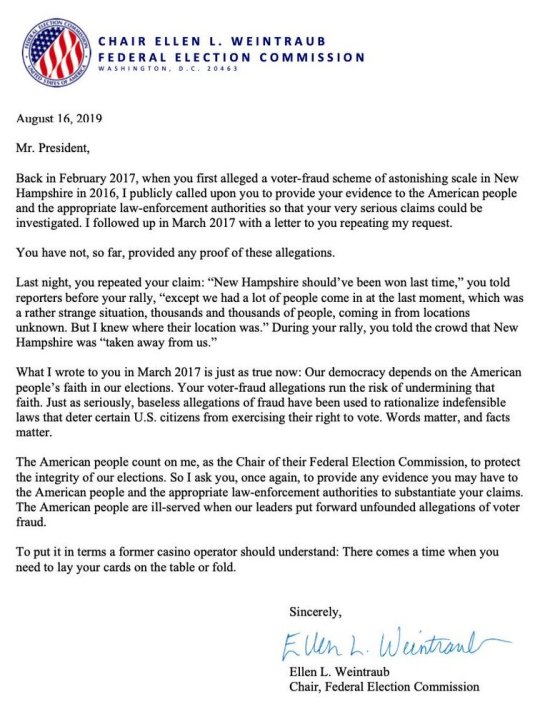
#fec#ellen weintraub#federal election commission#fec chair#trump#voter fraud#republican propaganda#trump propaganda#tre45on#potus45#lying trump#lying republicans#resisters#vote#vote2020#vote democrat#repeal and replace republicans#no republicans#no gop#no trump#mental illness#mentally unfit#fascist in chief#liar in chief#rigged elections#voter suppression#gerrymandering#integrity of elections
7 notes
·
View notes
Photo
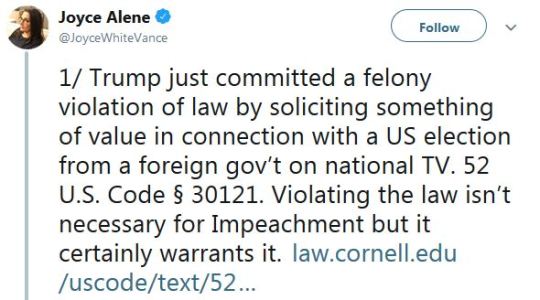
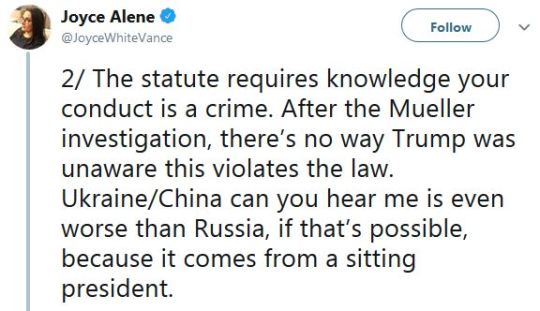
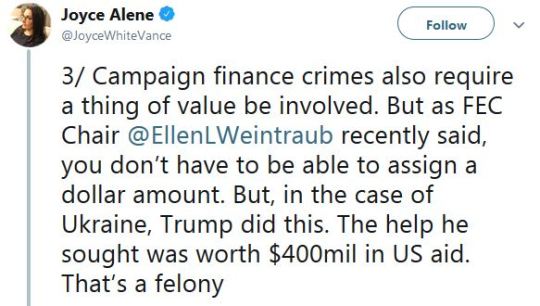
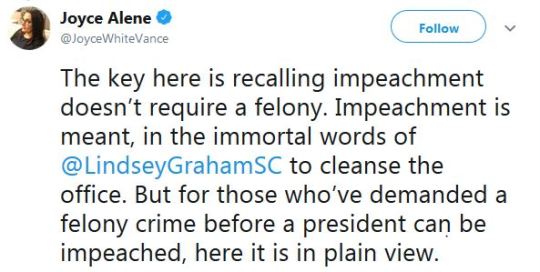
52 U.S. Code § 30121. Contributions and donations by foreign nationals
2 notes
·
View notes
Text
FEC Commissioner Has News For Trump: We Do Not 'Get Rid Of' Ballots
FEC Commissioner Has News For Trump: We Do Not ‘Get Rid Of’ Ballots
[ad_1]

Commissioner Ellen Weintraub of the Federal Election Commission has a news flash for President Donald Trump and anyone else who needs to hear it: “In the United States of America, we do not ‘get rid of’ ballots.”
Earlier, when asked during a press briefing if he would commit to a peaceful transfer of power if he loses the November election, Trump refused to do so, saying, “Well, we’re…
View On WordPress
0 notes
Text
As usual, he skates.

November 20, 2023
One of the most frustrating things about Donald Trump is that he commits so many crimes and breaks so many laws it's virtually impossible to hold him to account for them all. So, he avoids being criminally charged for many of the offenses of which he is so obviously guilty. Like his numerous violations of the Hatch Act, his years of money laundering, his income tax evasion or his various bribery schemes. Sometimes the fault lies with an overworked, overstretched legal system.
But all too often, Trump is simply handed a pass with the connivance of his fellow Republicans. That is, after all, why he escaped conviction in his two impeachment trials, despite the mountain of evidence against him. And it explains why the Federal Election Commission has repeatedly let Trump off the hook for breaching campaign-spending laws.
For example, one Democratic fundraising organization filed a complaint with the FEC in which it accused Trump of spending political funds for a 2024 presidential campaign without officially declaring his candidacy. Said the complaint, “His failure to timely file a Statement of Candidacy with the Commission is a clear violation of the [Federal Election Campaign Act of 1971.]”
In addition, the complaint stated Trump had been illegally using his "Save America" leadership PAC not for other candidates as required, but to raise and spend funds to advance his own presidential bid. The nonpartisan staff in the FEC's Office of General Counsel recommended that of the 58 allegations against Trump, his committees and his family, 28 should be investigated. You'll never guess what happened next.
Don't bother guessing. In a statement issued earlier this month, FEC Commissioner Ellen Weintraub reported that the "number of times a Republican Commissioner has voted to approve an OGC recommendation against Mr. Trump" was zero, indicating that "at the FEC, Mr. Trump is in a category by himself."
He sure is. In 2021, the FEC dropped a case looking into illicit hush-money payments in the lead-up to the 2016 election by his then-lawyer, Michael Cohen, to adult film actress Stormy Daniels. Even though Cohen testified that Trump arranged the payments, it was he, not Trump, who went to prison for violating campaign finance laws. Here's what Newsweek had to say.
While the Office of General Counsel said it had "reason to believe" violations of campaign finance law were made "knowingly and willfully" by the Trump campaign, the FEC voted not to proceed.
The FEC may let Trump get away with nonstop criming, but let's hope Jack Smith, Fani Willis and Letitia James won't be so forgiving.
0 notes
Photo

Despite public’s pleas, FEC won’t move to block foreign meddling in elections, commissioner says
The Federal Election Commission’s Ellen Weintraub is on a mission — but thanks to party politics, she says, it’s far from accomplished.
Weintraub, a Democrat who joined the agency in 2002, has been pushing for her group to respond to reports of foreign meddling in U.S. elections, laying out a six-point program for how the commission might do so.
“The mere allegation that foreign interference may have occurred shakes the faith of Americans in our democracy,” Weintraub wrote in the memorandum. Read more. (7/17/2017 3:45 PM)
177 notes
·
View notes
Link
Check out this listing I just added to my Poshmark closet: DINER (1982) Vintage LASER VIDEODISC.
0 notes
Text
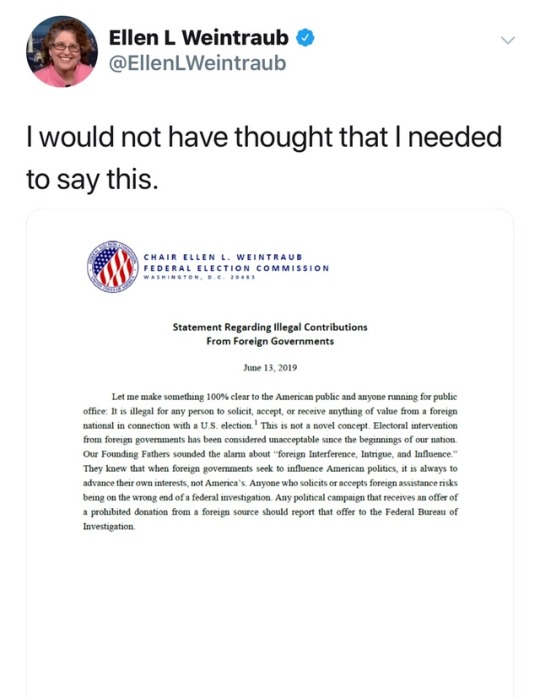
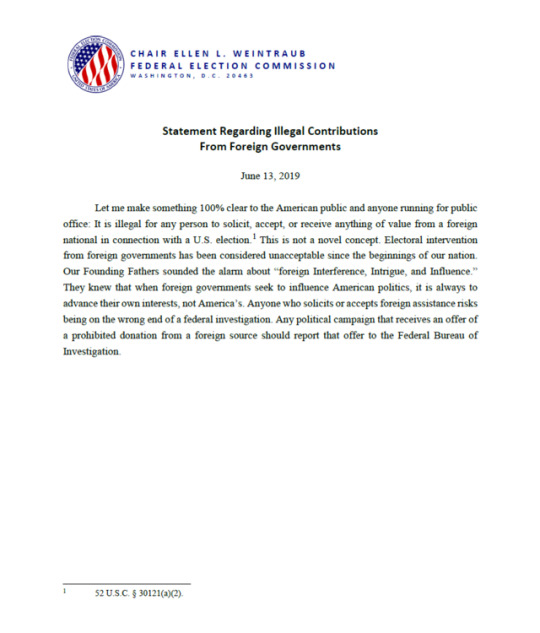
When the bar is so damned low that the obvious has to be spelled out for the
PRESIDENT of THE UNITED STATES
1 note
·
View note
Text
Ellen L. Weintraub, a commissioner for the Federal Election Commission, and Jena Griswold, Colorado Secretary of State, join Ali Velshi to discuss Arizona’s GOP-led re-audit of the 2020 election and why it sets a “dangerous” precedent for elections going forward. “I’ve observed elections around the world and I’ve never seen anything quite like this,” Says Weintraub. “There are increasing numbers of people who will not accept the results of an election as legitimate if the other team wins, and a democracy can’t function like that.”
71 notes
·
View notes